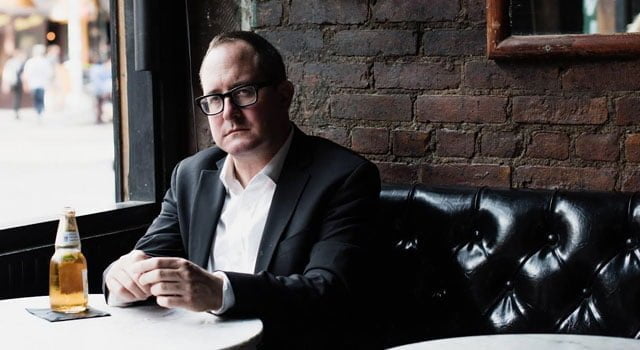
Craig Finn: “There’s a certain dark humour that comes out with a hangover.”
The Hold Steady frontman discusses his new, more elegant, solo album and the need to be age-appropriate in his writing.
 est known as the frontman and lyricist of Brooklyn-based rockers The Hold Steady, Craig Finn is a songwriter who is able to balance beer-chugging bombast with erudite character arcs. The storylines in his songs often reoccur, as expertly displayed on the group’s second album Separation Sunday and continued on their subsequent releases. Finn’s nuanced writing underpins the dynamite blasts of guitar and drums which make The Hold Steady one of the most exciting American bands of the last decade.
est known as the frontman and lyricist of Brooklyn-based rockers The Hold Steady, Craig Finn is a songwriter who is able to balance beer-chugging bombast with erudite character arcs. The storylines in his songs often reoccur, as expertly displayed on the group’s second album Separation Sunday and continued on their subsequent releases. Finn’s nuanced writing underpins the dynamite blasts of guitar and drums which make The Hold Steady one of the most exciting American bands of the last decade.
Songwriting had a chat with Craig on the eve of the release of his second solo record, Faith In The Future. An altogether more contemplative affair, it is an album which strips back the familiar layers to allow the vocals and lyrics to take centre stage. We spoke with him about this different approach and what it means to grow old gracefully as a rock ‘n’ roll songwriter…..
Where are you at the moment?
“I’m in Brooklyn, New York, where I live. I’ve been out on the West Coast for a while doing promo stuff and I got back a few days ago. I am now here for another ten days or so before I head to London. I’m pretty excited about that. Those are acoustic shows and then I hope to be over again later with a band.”
Is there a big songwriting scene in Brooklyn?
“It’s funny because so many bands are from Brooklyn now but it feels like it started just before The Hold Steady did. After the band happened we were on the road so much that I don’t feel in touch with that many musicians in Brooklyn. There definitely is a scene where a lot of people are working together and trading ideas, but for me it’s fairly solitary.”
Is that how you like to do your writing?
“Yeah I do, and more and more I punch the clock and go to work. That’s certainly how the songs on the new record came up. I just went to an office and worked every day. Editing has become more important. I get something down and start moving it around. I’ll usually give it 10 days to breathe and then I’ll come back and might say ‘okay, well this is alright’. Every year I quit drinking for Lent and this year I made a point of writing a song every day. I had 45 songs from that and hopefully 10 are pretty good.”
[cc_blockquote_right] THE SOLO STUFF IS QUIETER SO I CAN WRITE A LITTLE MORE MUNDANE [/cc_blockquote_right]How do those “dry” songs compare to your others?
“They’re very similar these days. I used to find that being hungover was a good time for me to write, there’s a certain dark humour that comes out with a hangover. Now I tend to live a little differently, so it’s all kind of sober writing.”
So your songwriting habits have evolved as you’ve become older and wiser?
“I think I’m writing songs at a different place at 44 then I did at 33 or 20. The Hold Steady’s music is so grand that I feel like I have to focus on big topics and have desperate characters. The solo stuff is quieter so I can write a little more mundane. A little more day-to-day. That allows me to be more vulnerable and probably more personal as well.”
To us Faith In The Future sounds more like a Sunday morning record than a Friday night record.
“Yeah absolutely. At 44 I feel more like a Sunday morning than a Friday night! A lot of the new songs came out of a period after my mum passed away, so with my writing I was trying to work through it a little bit. I didn’t write any songs specifically about that, and I still haven’t, but a lot of the songs ended up being about persevering after tragedy or change. I didn’t set out to do that but sometimes these things just reveal themselves to you and when I looked back at the batch of songs I found a theme that kept coming up and that’s why the album is called Faith In The Future. It’s about going to work and pushing through and believing that something better is on the other side.”
The press material focuses on 9/11 a lot but that doesn’t feel like a huge part of the album when you’re listening to it?
“Yeah, it got a little overstated in some of the press. There is certainly the song Newmyers Roof which is about the place where I watched the Towers go down but it is just one example of the tragedies that we have lived through, albeit a major one. It was interesting timing for me, I moved to New York almost a year to the day before that happened, and I’d just turned 30 and now in 2015 I’m looking back and trying to make sense of what’s happened since.”
Do you usually try and avoid writing about the big events or do you actively seek them out?
“These historical events like 9/11 affect you but on some level they don’t. A week later I was still expected to show up at work, so it doesn’t shut everything down. I feel like you put things in the songs and leave things out. There’s a line on the first song on this record, Maggie I’ve Been Searching For Our Son, which goes ‘a kid went to the movies with a gun’ and when I wrote it I was referring to a shooting in Aurora, Colorado where a guy walked into a theatre and started shooting people and unfortunately since then we’ve had two more of those. I think that speaks to the insanity of the customs in our country but it’s just one line. Obviously the song’s not about that but it’s got that one line. It’s kind of haunting, especially as these things keep happening. At this point it seems like it’s never going to stop.”
Do you view the world through the eyes of a songwriter or do you think it’s more subtle than that?
“It’s a little more subtle but I do think songwriting is my reaction to life. There’s been times in my life when I haven’t been in a band and I’ve still written songs and I’m pretty sure that will keep going until I die. I do believe that songwriting will always be my reaction to what happens to me.”
Are you ever worried when writing from a character’s point of view that listeners will think you’re being autobiographical?
“I have pushed through on that. It’s funny, I always laugh because everyone thinks that songs are so confessional but no one thinks that Quentin Tarantino does karate and shoots people. I look at it as me trying to do something cinematic. I know people do things that a very autobiographical but I feel pretty comfortable writing in character, although at the same time I was reading this biography about Joan Didion that just came out and her husband John Gregory Dunne said that ‘all novelists have one character and that’s themselves’ meaning it keeps showing up, parts of you keep showing up in these songs.”
Do people ever try and guess which characters are real and which aren’t?
“Yeah I think people guess and I’ve also had people try to say that they’re certain characters. A couple of people thought they were this one character Holly from The Hold Steady album Separation Sunday. But they were all wrong, it was all made up. It’s composites and it’s certainly influenced by real life but especially in The Hold Steady I feel like I have to make it bigger and better. My own life is not exciting enough to make it into a Hold Steady song.”
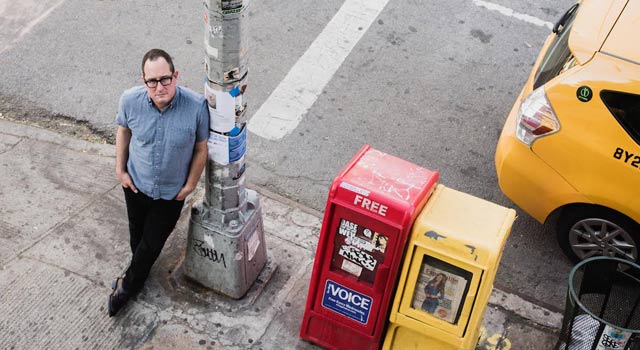
Craig Finn: “I find walking around strange places really inspiring.”
Are there specific things you’ve done to make the solo record sound different from The Hold Steady?
“From the get-go I talked to the producer, Josh Kaufman, and I said ‘I want to make something elegant and hopeful’ and by elegant I mean something that is age appropriate for a 44-year-old and something that reflects how I feel, like a Sunday morning. One of the things he came up with right away was that we needed to let the narrative come through. A lot of the decisions were made with that in mind. For instance, there’s no drumsticks on the records, it’s all brushes and mallets and we found that freed up the vocals. Probably more importantly, there are barely any cymbals as they would get in the way of that frequency we wanted. So we were really making decisions to push the vocals and the stories upfront.
[cc_blockquote_right] I ALWAYS LOOK TO NICK CAVE AS THE ULTIMATE IN HOW TO AGE GRACEFULLY IN ROCK ‘N’ ROLL [/cc_blockquote_right]“We also recorded it with just three other people. We had an engineer, a drummer and the producer. I played guitar, Joe Russo would play drums and Josh would play bass or piano or something. We’d just record it with all of us in a room and then we’d say ‘what else does it need’. In some cases we tried to keep things pretty unadorned and that’s a kind of a thing you’re able to do on a solo record a little easier than in a band. For instance, on the song Christine we decided that it sounded better with the drums out, so we mixed the drums out. It still comes through the other mics a little bit in the bleed but the point is, if you’re in a band it’s a harder conversation to have, to say ‘there’s going to be no drums on this one’.”Do you like the contrast of being able to go back to The Hold Steady and rock out again?
“Yeah I like both. There’s a camaraderie in a band and also there’s the throwing-beer-in-the-air energy of The Hold Steady that I love and I really do love it, but I like flexing both muscles.”
Was there anything that you were listening to in particular that influenced Faith In The Future?
“There was some New York stuff that I was really leaning on like the early Lou Reed solo albums and the Mink DeVille album Cabretta. Those were the big ones. Also, and I don’t think it sounds like it, but I always look to Nick Cave as the ultimate in how to age gracefully in rock ‘n’ roll. He’s always awesome and always elegant. Sometimes he’s rocking pretty hard but he never seems silly. I think Grinderman is some of the greatest stuff he’s done. He’s always smart and his music is always cool, I don’t think I sound like him or that the record sounds like that, but I do always look to him in terms of being age-appropriate, I look to him as a beacon.”
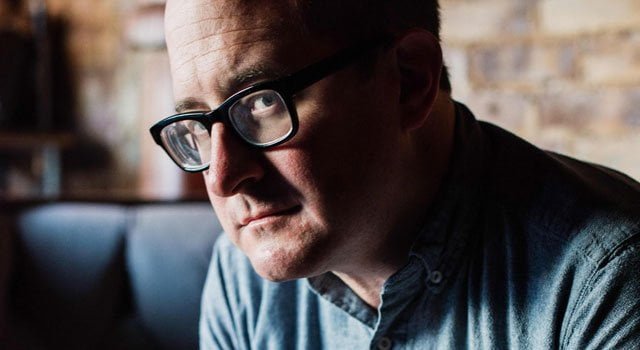
Craig Finn: “You can’t remember everything, especially as you get older.”
Have you embraced technology in your writing, do you still keep a notebook?
“I keep a Moleskine notebook but then as I edit I transfer ideas into my laptop and create a form there. It is a process of editing that I go through. If it’s a keeper it ends up on my laptop and I make decisions at that point about what verses to keep.”
Keeping a notebook is definitely a recurring theme among the songwriters we talk to.
“You can’t remember everything, especially as you get older. I also read. I’ll be reading a book and will start writing things down that sound interesting to me. Then you’ll go back a little while later and find they’ve become removed from their context a little bit and you can then start playing with those words.”
Do you ever eavesdrop on other people’s conversations for ideas?
“Constantly, the train is one of the places I get a lot of stuff and also on tour I’m kind of a walker. I like walking around. I find walking around strange places really inspiring, thinking about stories and wondering about what goes on inside certain buildings.
“The Hold Steady song The Swish came out of an eavesdropping on the train, a guy was saying he was partying in Beverley Hill the night before and it became ‘pills and powders, baby, powders and pills, we spent the night last night in Beverly Hills’. Another origin story comes from the second song on this record Roman Guitars. I was at my friend’s house and his young son Roman, who is about five, had a little toy guitar and I picked it up and started playing it and I wrote that song on the spot. I called it Roman’s Guitar as a working title, as I wrote it on his little toy guitar. I eventually changed it as I thought it sounded cooler as Roman Guitars, but that’s the kind of thing you just keep playing until they work.”
So what’s next for you?
“After the London shows we do a US tour with a full band and then I’m hoping to be back in the UK with a full band in 2016.”
Finally, if you could write your own epitaph for Craig Finn the songwriter, what would you want it to say?
“He did his best!”
Interview: Duncan Haskell
Faith In The Future is out now on Partisan Records and Craig will be playing at The Slaughtered Lamb in London on 15 September. For more information go to: facebook.com/CraigSteady

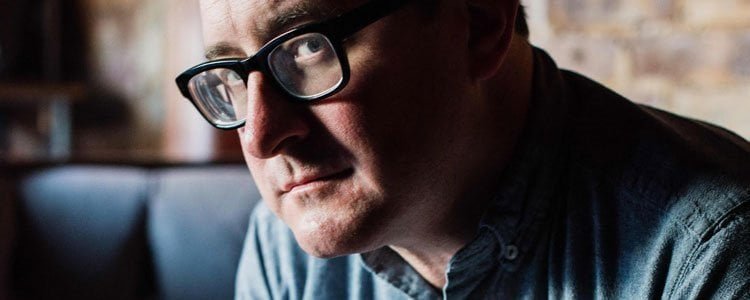



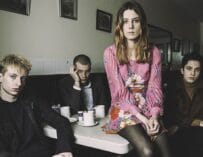
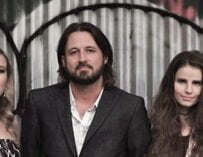


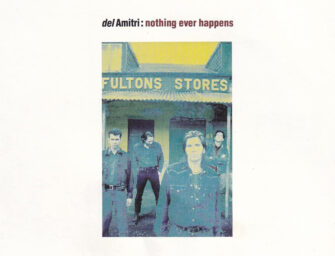

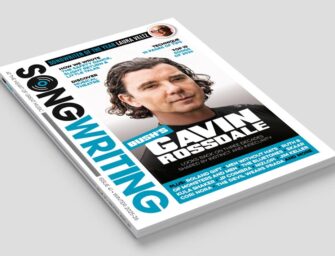
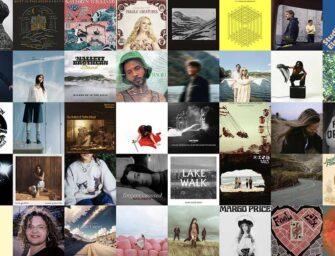





















Related Articles